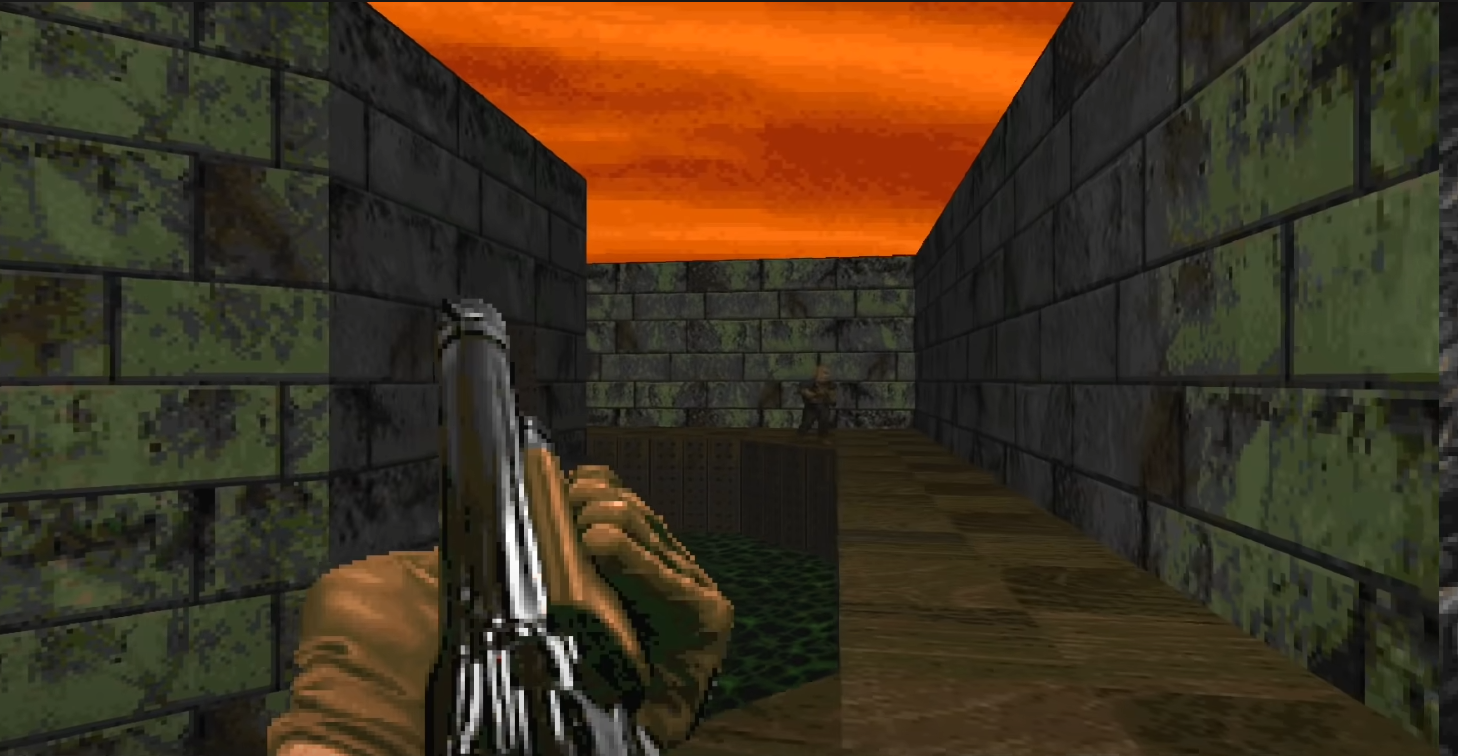From Wolfenstein 3D to Doom: How id Software Popularized the First-Person Shooter
The first-person shooter is one of the most established genres in the gaming industry. A category so universally played and widespread in the current gaming climate that you’d be forgiven for thinking it had always existed as an eternal feature at the frontier of gaming – a permanent monolith still standing structurally sound amidst a constantly shifting marketplace. Only ever increasing in its popularity year on year.
Yet, curiously enough, that hasn’t always been the case. An era of history often forgotten, today we rechart the legendary birth of the first-person shooter genre, paying homage to its inescapable influence on the gaming landscape. All while praising the early innovators on whose shoulders modern titles stand with such reflective admiration.
Be sure to share your favorite first-person experiences in the comments. Without further delay, it’s time to polish up those trusty pistols as we run-and-gun our way back to where it all began.
The Impactful Arrival of Id Software
Often overlooked, the first-person viewpoint existed before id Software’s pivotal impact on the development scene. For instance, early pioneers such as Richard Garriot’s 1976, Akalabeth, experimented with the concept of first-person exploration, albeit in primitive form, offering raw, dungeon-crawling sections in which players could restrictively roam.
Revolutionary for their time, water-testing archetypes like Akalabeth would lay the foundation for a series of earthshattering FPS breakthroughs later attributed to Id Software. But, unknowingly, waiting in the wings was an unexplored avenue of game genre, secretly possessing the power to propel and popularize the “shooter” to unprecedented heights.

Widely credited with establishing the first-person genre is 1992’s Wolfenstein 3D. Through its exploration of 3D space and strict enthesis on fast-paced shooter mechanics, Wolfenstein 3D set an unprecedented technical benchmark for its time in terms of robust and reliable game design.

Still, perhaps, more importantly, it offered players a more immersive experience than other titles of its era, utilizing the first-person perspective to full effect. While simultaneously empowering the player through heart-pounding, pulse-triggering gunplay. After all, there must be a valid reason why the title “grandfather of 3D shooters” is often attributed to this timeless classic.
The Meteoric Rise of Doom
For its creators, John Carmack and John Romero, Wolfenstein merely marked the beginning of a historic collaboration that would later define the common principles of the shooter genre. A year after its celebrated release, id introduced the gaming world to a spiritual successor that sent tremors coursing throughout the gaming industry.
In the wake of its meteoric release, Doom helped reshape and cement the pre-established pillars of game design for future generations.
Despite drawing considerable controversy for its gratuitous violence and hellish themes, Doom further refined Wolfenstein’s formula on all fronts. As a result, levels were more elaborately designed, whose cleverly conceived complexity created a significant challenge – resembling huge strides forward in game design.

Elsewhere, guns were satisfyingly balanced but sufficiently powerful, which lent itself well to the adrenaline-inducing action synonymous with id Software. But now, its thrillingly tense combat and bullet-spraying carnage were complimented by exciting feats of exploration, fueled, to some degree, by the arrival of 3D and its immersive qualities.
Doom was so culturally revolutionary for its time that it even coined a new term – a blanket phrase to which all future FPS games would be held to account. “Doom clone” was now the established standard for any game bearing the hallmarks of id Software’s legendary shooter.
Like it or loath it, all subsequent shooters would be, perhaps unfairly, compared with Doom from that point on. Despite this, its legacy within the shooter genre far exceeds the game mechanics it single-handedly trailblazed.
Conclusion
Without Doom, the online aspects of play we take for granted in today’s current climate may never have fully formalized. Besides, Doom’s early endeavors into network functionality paved the way for competitive multiplayer in the online arena.
From setting the gold standard in game design to embarking on a boldly ambitious voyage into the uncharted realm of online multiplayer, no game has had a more significant impact on the industry.
Future franchises like Quake, Goldeneye, Timesplitters, and Half-life would perfect Doom’s components – streamlining many systems in their wake. But ultimately, Doom’s philosophies of the core fundamentals, such as tense, fast-paced combat, and empowering gunplay, have stood the test of time.
If anything, these aspects are as important now as they have ever been. In essence, id’s passing of the torch is perhaps the biggest compliment one can issue. At its thrillingly hellish core, Doom is, and will forever remain, an immortalized icon of our industry.
Would we love to hear from you, the gamer? What are your thoughts on Doom? Equally, do you have a favorite FPS of all time? Do share your comments down below, and until next time, that was a mighty fine shooting display, soldier!
See you on the frontline.
-

Robbie is a lifelong gaming enthusiast who grew up in the glorious era of Goldeneye split-screen multiplayer. Although he's excited for Ragnarok, Robbie is often found delving back into his retro roots; entirely convinced Metal Gear Solid 1 and Ocarina of Time are masterpieces of equal merit.
You May Also Like
 Controls for Wolfenstein: Youngblood
Controls for Wolfenstein: Youngblood
 DOOM Eternal – Console Commands
DOOM Eternal – Console Commands
 Doom Eternal Cheats
Doom Eternal Cheats
 Doom Eternal Hell On Earth – Toy Locations Guide
Doom Eternal Hell On Earth – Toy Locations Guide
 DOOM Eternal PC Keyboard Controls Guide
DOOM Eternal PC Keyboard Controls Guide
 How Do I Download Wolfenstein: Youngblood?
How Do I Download Wolfenstein: Youngblood?
 How GTA 3 Established & Popularized the Open-World Genre
How GTA 3 Established & Popularized the Open-World Genre
 Playing Through DOOM on Ultra Nightmare Takes Just Under Five Hours
Playing Through DOOM on Ultra Nightmare Takes Just Under Five Hours
 PS4 Controls for Doom Eternal
PS4 Controls for Doom Eternal
 TOP 5 Upcoming Doom-Like Shooters That Look INSANE for 2022 & 2023
TOP 5 Upcoming Doom-Like Shooters That Look INSANE for 2022 & 2023
 Wolfenstein: Youngblood Controls
Wolfenstein: Youngblood Controls
 Xbox One Controls for Doom Eternal
Xbox One Controls for Doom Eternal



